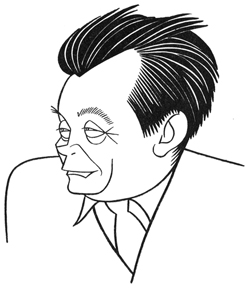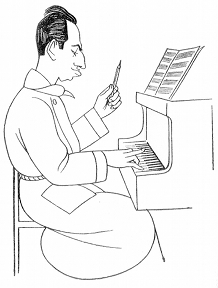Here are 10 things you should know about Claire Trevor, born 112 years ago today. An Oscar winner, she enjoyed success on stage, in pictures, in radio and on television.
Tag: Columbia University
10 Things You Should Know About Ralph Morgan
Here are 10 things you should know about Ralph Morgan, born 138 years ago today. A leading man on Broadway, he was primarily a character actor in pictures.
Times Square Tintypes: Samuel Shipman
In this chapter from his 1932 book, Times Square Tintypes, Broadway columnist Sidney Skolsky profiles Samuel Shipman, a playwright of some prominence in the first half of the twentieth century.
NO MAN IS A HERO TO HIS VALET
 SAMUEL SHIPMAN. When he was graduated from Columbia this line appeared under his picture in the college book: “God Makes Some Strange Things.”
SAMUEL SHIPMAN. When he was graduated from Columbia this line appeared under his picture in the college book: “God Makes Some Strange Things.”His first play, which he wrote at the age of twelve, was something called Justice. It was performed at the Jewish Educational Alliance.
He is marvelously unkempt. Even after he has had a shave and a haircut he needs a shave and a haircut.
As a kid he wore phony jewelry to appear rich.
Writes all his plays in Atlantic City. He engages a suite in one of the exclusive hotels. He always takes two stenographers an a collaborator with him. He dictates everything he writes. Paces the floor and is often in another room shouting the lines. The stenographers work in relays, one resting while the other is taking the dictation.
He never sleeps more than four hours a day. And always one of these hours is between five and six in the morning.
He made a million dollars in royalties from Friendly Enemies and East Is West. So did Wall Street.
Likes to drink and play with tea. Is always pouring the tea from the glass to the saucer and then back into the glass.
Has only one superstition. That is he must start an finish his plays on a Tuesday. It doesn’t matter if the Tuesdays are months apart.
He once taught English in an East Side school.
Everything he does he describes as “terrific.”
Has only one superstition: that is, theatrical notables. Eugene O’Neill, for example, he believes is only an intellectualized Theodore Kremer. Claims the only thing he likes about George Jean Nathan is H. L. Mencken. A. H. Woods is his favorite producer. Because whenever he hands that impresario a flop Woods never cries, but merely says: “It’s all right, sweetheart; try again.”
He rarely eats meat. His favorite meal is one composed solely of caviar.
Likes to go prowling about the city at night and often sets out at midnight, alone.
The sight of fish fascinates him. He is a frequent visitor at the Aquarium.
He never hangs up anything. His clothes are sprawled about the house. On entering he tosses his hat anywhere. His coat is dropped on the living room floor; the vest on the bedroom floor. His trousers he carefully places at the foot of his bed. He dresses faster than a fireman.
To date he has had twelve collaborators. His favorite is John B. Hymer because Hymer understands him.
He wants to know everything before anyone else.
Never reads a book during the winter. Every summer he goes for a vacation in the Catskill Mountains, taking two valises full of books with him.
Doesn’t like young girls. Never goes out with a lady under thirty-five.
Never falls in love with an actress. His sweetheart is a nonprofessional. Her parents, however, dislike everything connected with the theater and won’t allow him in the house.
His ambition in life is to write the libretto of an opera and to have it presented at the Metropolitan Opera House.
He suffers from indigestion. His secretary carries his pills and reminds him when he has indigestion.
At Columbia he studied playwriting under Brander Matthews, who gave him a C minus. He asked that his mark be raised and Matthews asked why. Shipman then pulled out a contract for a play he had just sold. Matthews merely replied: “It’s the old story. Theory is theory and practice is practice.”
He covered the Ruth Snyder case for a tabloid newspaper.
Never cleans his shoes on the outside, but only inside. This, he claims, is healthy for the feet.
He can recite most of Ibsen’s plays from memory. While writing a play his teeth become loose; in fact, so loose that he can pluck them. To date he has plucked six. The minute the play is finished his teeth tighten. He is continually visiting dentists because of this condition.
The greatest disappointment one can get in life, he believes, is meeting somebody one had heard a lot about.
One evening at the Lambs Club Eugene O’Neill was playing poker with a group of playwrights. After losing all his money O’Neill offered to play on his ability as a dramatist. After another hour of heavy losing O’Neill got up and started for home. As he was leaving the doorman said: “Good night, Mr. Shipman.”
The only time he ever combs his hair is before going to bed.
Times Square Tintypes: George Gershwin
In this chapter from Times Square Tintypes, Broadway columnist Sidney Skolsky profiles George Gershwin, who then cast one of the longest shadows over Broadway.
By 1932, when this book was published, Gershwin had written most of the orchestral works that remain so celebrated today, including Rhapsody in Blue (1924), Piano Concerto in F (1925), An American in Paris (1928), and The Second Rhapsody (1931), and had experienced great success on Broadway with such shows as “Oh, Kay!” (1926), “Strike Up the Band” (1927), “Funny Face” (1927), “Girl Crazy” (1930), and “Of Thee I Sing” (1931).
“STRIKE UP THE BAND”
A man of note. George Gershwin.
Suffers from indigestion. Every night before retiring he takes agar-agar, a new medicine.
Was born in Brooklyn, September 16, 1898, and came to this country at the age of six weeks. Has two brothers, Ira and Arthur, and one sister, Frances. As a youngster he was the champion roller skater of his neighborhood.
Smokes a cigar out of the side of his mouth and wears a high hat gracefully. He didn’t start to smoke until he was twenty.
His father, Morris, because of his unconscious humor, is the life of his Gershwin parties. Morris has been designer of fancy uppers for women’s shoes, owned several cigar stores, owned a billiard parlor, owned a Turkish bath place and was a bookie. Morris also entertains by imitating a trumpet.
Took his first piano lesson when he was thirteen. At sixteen he was working for Remick’s. His boyhood idols were Jerome Kern and irving Berlin.
The thing he values most is an autographed photograph of King George of England. It bears this inscription: “From George to George.”
He wrote his first song when he was fourteen. It was a nameless tango. His second composition (now he had learned to title them) was “Since I Found You.” It was never published. His first published song, “When You Want Them You Can’t Get Them And When You’ve Got Them You Don’t Want Them,” he sold to Harry Von Tilzer for five dollars.
Twice a week he visits an osteopath.
Hates cards. His favorite game is backgammon. Occasionally he shoot craps.
He once worked as relief pianist at Fox’s City Theatre. Was fired because an author complained that he didn’t know how to play the piano.
An English publisher sends him copies of rare and first edition of such authors as Galsworthy, Shaw and Barrie in return for an occasional song.
His first piano teacher, whose memory he cherished, was Charles Hambitzer. His present teacher is Mme. Boulanger in Paris. The first time he went to Paris to study he came back with a trunkful of shirts and ties. On his last trip he returned with a $10,000 organ which he has yet to unpack.
Hard liquor doesn’t appeal to him. He likes a glass of real beer. After more than one cocktail his eyes begin to shine.
The first long piece he ever wrote was not “The Rhapsody in Blue.” But one called “135th Street.” It was performed by Paul Whiteman in the Scandals of 1921 for one performance only. It was taken out because it was too sad.
He is very particular about his clothes which are made to order. Even when he made only $25 a week he spent $22 for a pair of shoes.
Writes whenever the mood seizes him. He may have just returned home after a party and still attired in his evening clothes he will sit down at the piano. Or he may compose wearing pajamas, or a bathrobe—or even nude.
He is physically very strong. Especially his arms which are powerful. He is a swell wrestler.
His brother Ira writes the lyrics for his songs. Before, Irving Caesar and Buddy De Sylva had the honor.
“The Rhapsody in Blue” was played for the first time, February 12, 1924, at Aeolian Hall. It took him three months to write it. It took him eight months to write “An American in Paris.” His first real popular hit was “Swanee.” This was written for the revue that opened the Capitol Theatre.
Is bashful about playing the piano at parties. He has to be coaxed. Once he starts, however, you can stop him. He says, “You see the trouble is, when I don’t play I don’t have a good time.”
In the volume called Great Composers As Children he is the only living composer listed.
One evening the family discussing the new Einstein paper. George expressed his surprise at the compactness of the scientific vocabulary. He said: “Imagine working for twenty years and putting your results into three pages?” “Well,” said Papa Gershwin, “It was probably very small print.”

